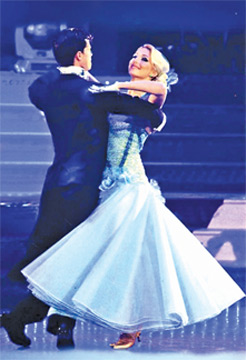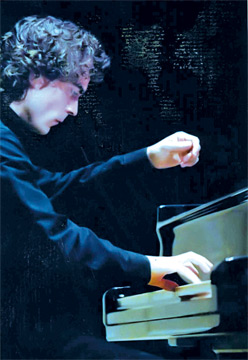Paul Lewis : favours Strauss
by Gwen Herat
It is not often that conductors favour the Strauss clan opting for
other composers of repute and especially Richard Strauss who trails
behind the rest of Strauss trio; all resembling each other in harmony
and waltz strain that the music world came to identify them with.
|

The Viennese Waltz is often danced to Strauss music in
ballroom displays. |
The waltzes such as the Viennese Waltz, Tales from Vienna Woods and
Emperor Waltz still haunt me and remain as fresh as ever, tracing back
to the days I studied.
When I watched Paul Lewis who is better classified as the leading
pianist in Britain today, it amazed me to watch and hear how cleverly he
handled the keyboard with the strings to produce such allure in sound,
tantalising the audience.
To me it was a miracle because I always associated string music with
a large orchestra that Strauss was seen in concert halls. But here he
was as strong as ever imaging the ballroom floor with women in their
spectacular gowns and men in tails waltzing away among arabesque dreams
in the minds of the audience who were packed at the Southbank Centre,
London.
Everyone who listened to his playing, visualised dreams filled with
colour. Paul Lewis rose to that level.
Lewis elected to conduct two favourite scores of Richard Strauss,
Prelude to Carpiccio, Op-86 and Sernedae in E Flat, Op.7.
Final opera
Written in 1942 Prelude to Capriccio Op, 86 is the lesser known score
of the two scores just a few years before he died. It was his final
opera on one of the central themes of Wagner's philosophy when it starts
at a point which is more important to the question. Is it words or music
that matter most.
One must remember that Strauss was greatly influenced not only by
Wagner's music but also his philosophy of life. It contains less
dramatic stage work which later Strauss titled as a conversation Piece
of Music.
The quandary is that it manifests itself in the story of a Countess
torn between two suitors; Oliver, a poet and Flamand, a composer. Set in
pre-revolution Paris as such, it centres around a deep discussion as to
how best the way to celebrate the birthday of the countess.
Birthday gift
When it was proposed an opera as the birthday gift, both men agreed
to help. Oliver wrote the Libretto and Flamand composed the music which
later would make the countess make up her mind which suitor to choose.
|

Paul Lewis, Pianist/Conductor |
A chamber music rehearsal took place in an off-stage room as the
opera opened and that moment Stauss made up his mind to do an unusual
step to score the Prelude itself for a string sextet so that we all
would imagine the music as a dramatic part of action. It developed and
displayed a remarkable amalgam musical style. Elements of Brahmsian
development mingled with complex Baroque counterpart. An amature will
find it difficult to follow him up that led him to the traditional
classical textures.Such diversity is typical of Strauss’ mature style.
It makes long to understand him.
This fabulous masterpiece was when he was just 17 and written for 13
wind instruments.
Although sculpted as one single movement, the Serenade is really a
series of distinct ideas which Strauss linked together to form one
flowing set of melodies.
With its multi-melodies that open with a sombre but evocative
introduction; more Chorale-like in its broad textures where the melody
is passed between instruments, first from the flute to clarinet before
the horns punctuate the texture and signal the onset of a new section.
Serenade in E Flat Op.7
The dramatic section which ebbs and flows with growing intensity
increases with each passing phrase before a gentle Coda takes the work
full circle and ends with a hush sedate sound.
Strauss handles his resources and demonstrates the confident composer
he is.
Richard Strauss wrote a symphonic poem glorifying and celebrating the
day-to-day trivialities. Many of his fellow musicians held him in
contempt for his egotistical demeanour but there was no denying the
immense impact his music influenced the world and silenced the critics.
Paul Lewis, piano/director is one of the most sought after artistes
of his generation at World's major musical venues. His highly acclaimed
Schubert piano sonata series presented at venues throughout the UK won
him the Southbank Show Classical Music award and the Royal Philharmonic
Society's Instrumentalist of the Year in 2006.
From hence, he has zoomed into the top spot as the most celebrated
pianist of his generation.
He is still on the up and up. |

